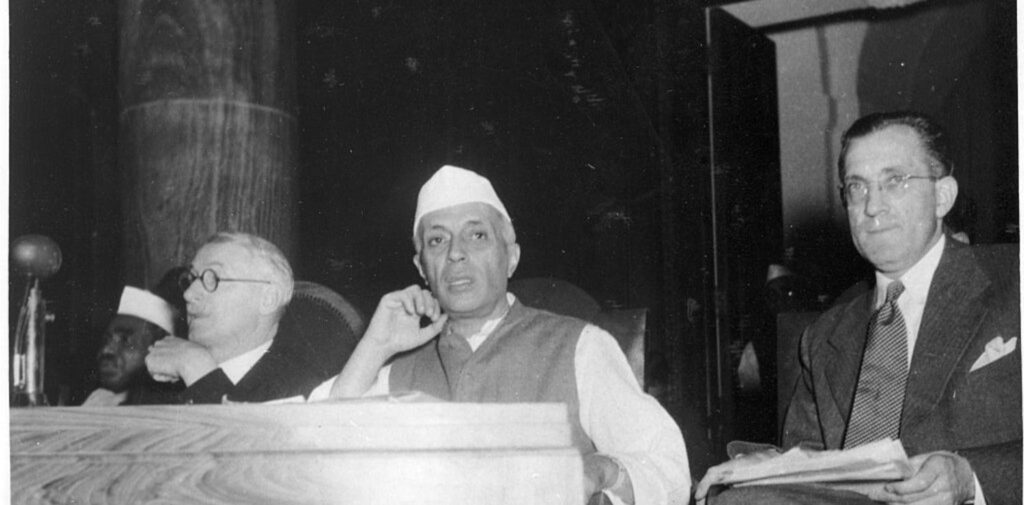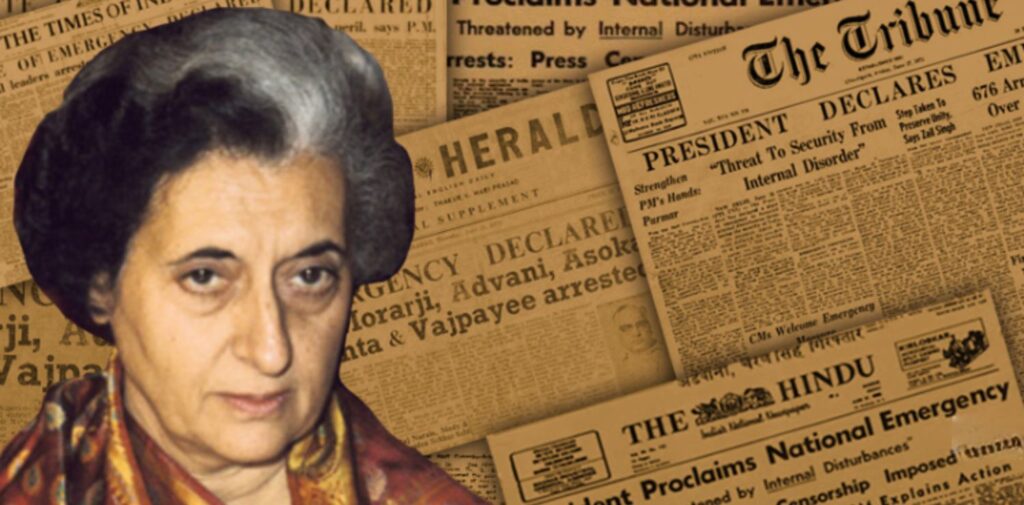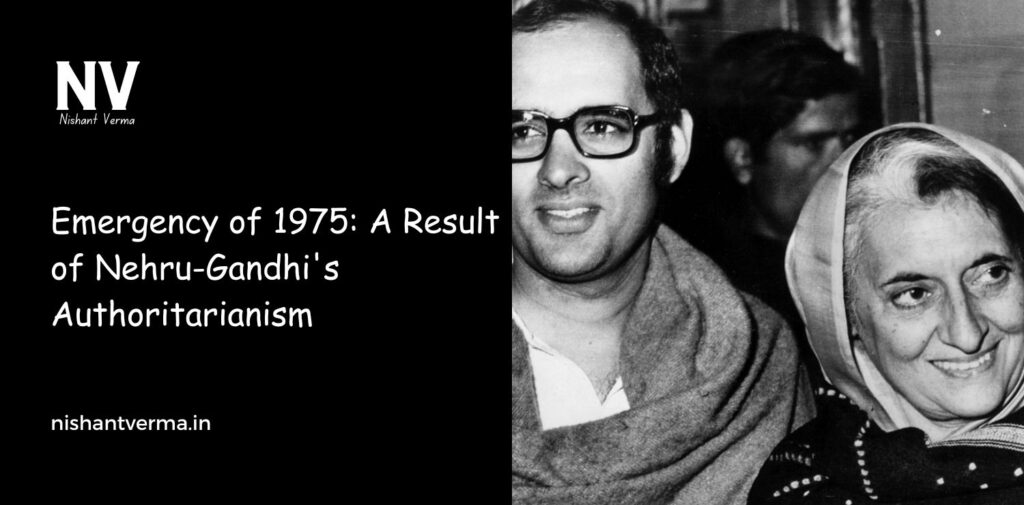The Emergency of 1975 in India is one of the darkest chapters in the country’s political history. It was a time when democracy was suspended, basic rights were curtailed, and millions of people were affected by the imposition of authoritarian rule. The Emergency was declared by Prime Minister Indira Gandhi, but its roots can be traced back to the political culture established by her father, Jawaharlal Nehru. Their leadership created an environment where centralization of power and authoritarian tendencies gradually grew, leading to the eventual declaration of the Emergency.
To fully understand why the Emergency occurred, we must examine the political circumstances of the 1970s and the role played by both Nehru and his daughter, Indira Gandhi, in shaping India’s political landscape. While Nehru was known for his democratic vision and dedication to India’s sovereignty, his policies of centralization and control over institutions helped create an environment where authoritarianism could take root. Indira Gandhi, his daughter, continued many of these practices, but during times of crisis, her actions became more autocratic, eventually leading to the Emergency.
The Roots of Authoritarianism in Nehru’s Era
Jawaharlal Nehru, India’s first Prime Minister, was deeply committed to building a strong and unified nation. As a leader, he worked hard to establish institutions that could guide the newly independent country toward progress. However, Nehru’s vision for India was not without its challenges.
- Centralization of Power: One of the key features of Nehru’s leadership was his centralization of power in the hands of the federal government. Nehru was wary of state governments becoming too powerful and often overruled states when their policies conflicted with those of the central government. This centralization helped the federal government dominate the political landscape, reducing the power of regional parties and voices. While centralization was seen as a means of ensuring unity and progress, it also eroded the democratic values of decentralization and autonomy that are fundamental to a true democracy.
- Control over Institutions: Nehru also took steps to strengthen the power of the executive, often at the expense of other branches of government. He was deeply involved in the functioning of the judiciary and the legislature. In some instances, he used his influence to suppress opposition and maintain a tight grip on power. This trend of central control continued during Indira Gandhi’s time, setting the stage for her eventual shift towards authoritarianism.
- Overdependence on Party and Leadership: Nehru’s Indian National Congress (INC) became the dominant political party in the country, and this created a culture of unquestioning loyalty to the leader. While this loyalty helped Nehru in shaping the nation’s development, it also created a political culture where dissent was often viewed as disloyalty, and checks on power were weak.

Indira Gandhi’s Rise to Power
Indira Gandhi, the daughter of Jawaharlal Nehru, became Prime Minister in 1966 after the death of Lal Bahadur Shastri. While she initially appeared to follow her father’s policies, her leadership style was very different. Over time, she became more assertive, centralizing power in her hands, and moved away from the democratic principles that were central to India’s early years.
Her political career was shaped by her rise to power within the INC and the larger political challenges of the time. During the 1970s, India faced several crises, both internal and external, that tested Indira Gandhi’s leadership.
- Economic Troubles: India was experiencing economic difficulties in the early 1970s. High inflation, food shortages, and economic instability created widespread dissatisfaction. The situation worsened as the global oil crisis of 1973 raised fuel prices. People were frustrated with the government’s inability to solve these problems.
- Political Unrest: There were rising demands for social and political change. Various opposition parties were gaining ground, and movements for regional autonomy were also gaining momentum. The state of Gujarat saw large protests due to the rising prices and unemployment, which eventually spread to other parts of India.
- The 1971 War and Its Aftermath: India’s victory in the 1971 war against Pakistan, which led to the creation of Bangladesh, had enhanced Indira Gandhi’s political standing. However, the aftermath of the war left India with a large economic burden. There were tensions on the political front, and the government’s focus shifted to maintaining control over the political narrative rather than resolving the underlying issues.

The Turning Point: The Allahabad High Court Verdict
In 1975, a critical turning point occurred that paved the way for the declaration of the Emergency. Indira Gandhi was challenged by Raj Narain, her opponent in the 1971 general elections. He accused her of electoral malpractice, claiming that she had used illegal methods to win the election. The Allahabad High Court ruled in Raj Narain’s favor, declaring Indira Gandhi’s election to be invalid.
This verdict was a major blow to her political career. It could have led to her disqualification from office and the calling of new elections. However, instead of accepting the verdict, Indira Gandhi took the drastic step of declaring a state of emergency across the country on June 25, 1975, under Article 352 of the Indian Constitution, citing internal disturbance as the reason.
The Declaration of Emergency
The Emergency allowed Indira Gandhi to rule by decree, bypassing the normal democratic processes. It suspended many fundamental rights, including the right to freedom of speech, the right to assembly, and the right to habeas corpus (protection against illegal detention). Opposition leaders were arrested, and press censorship was imposed. Indira Gandhi effectively silenced all dissent, curbing democratic freedoms and imposing a state of authoritarian rule.
The Emergency was justified by Indira Gandhi as a necessary measure to restore order and maintain national stability. She argued that the country was facing grave internal challenges and that the only way to address these challenges was through strong, centralized leadership. However, critics argued that the Emergency was a political tool used by Gandhi to retain her power after the verdict against her.

The Impact of the Emergency
The Emergency had wide-ranging consequences for India’s political system and its democracy:
- Suppression of Dissent: One of the most significant consequences of the Emergency was the suppression of political opposition. Many opposition leaders, including prominent figures like Jai Prakash Narayan, Morarji Desai, and L.K. Advani, were arrested. Political activity was severely restricted, and people lived in fear of being detained without reason.
- Censorship and Control Over Media: The press was heavily censored, and news was controlled by the government. Journalists were forced to publish only content that was favorable to Indira Gandhi and her government. This stifled free speech and denied the public access to truthful information about what was happening in the country.
- Erosion of Democratic Institutions: The Emergency marked a turning point in India’s democratic development. The centralization of power that had begun under Nehru’s leadership reached its peak under Indira Gandhi. Democratic institutions like the judiciary, the press, and political opposition were undermined, and India’s democracy was put at risk.
- Public Backlash: After 21 months, the Emergency was lifted, and elections were held in 1977. The Indian public expressed their anger and frustration by voting overwhelmingly against Indira Gandhi’s Congress Party. The Janata Party, a coalition of opposition parties, came to power, marking the first defeat of the Congress Party since independence. This electoral defeat was a powerful reminder of the importance of democracy and the risks of authoritarian rule.
Conclusion
The Emergency of 1975 was a direct consequence of the centralization of power and the growing authoritarian tendencies that had developed under both Nehru and Indira Gandhi. While Nehru’s leadership style laid the foundation for strong central authority, it was under Indira Gandhi that these tendencies reached their peak. The Emergency marked a tragic period in India’s democratic history, where basic rights were suspended, opposition was crushed, and the country was ruled by decree.
The Emergency left a lasting impact on India’s political landscape, reminding the nation of the dangers of unchecked power and the importance of preserving democratic values. While Indira Gandhi’s political career recovered after the Emergency, the damage to her reputation and the memory of this period have remained significant in India’s collective consciousness.




